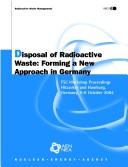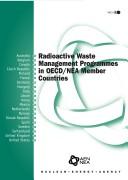| Listing 1 - 10 of 76 | << page >> |
Sort by
|
Book
Year: 2016 Publisher: Paris : OECD Publishing,
Abstract | Keywords | Export | Availability | Bookmark
 Loading...
Loading...Choose an application
- Reference Manager
- EndNote
- RefWorks (Direct export to RefWorks)
Radioactive waste management is embedded in broader societal issues such as the environment, risk management, energy, health policy and sustainability. In all these fields, there is an increasing demand for public involvement and engagement. This 2015 update of Stakeholder Involvement Techniques: Short Guide and Annotated Bibliography, assists practitioners and non-specialists by outlining the steps and issues associated with stakeholder involvement in decision making and by facilitating access to useful online resources (handbooks, toolboxes and case studies). The updated guide has been considerably enriched with experiences since 2004 and includes extensive references to the literature. It is published alongside the release of an online annotated bibliography that will be updated regularly.
Book
ISBN: 9264808450 Year: 2020 Publisher: Paris, France : Organisation for Economic Co-operation and Development Publishing,
Abstract | Keywords | Export | Availability | Bookmark
 Loading...
Loading...Choose an application
- Reference Manager
- EndNote
- RefWorks (Direct export to RefWorks)
Berdasarkan pencapaian sejak Kajian Kebijakan Investasi OECD Indonesia pertama satu dekade lalu, Kajian Kedua ini menyajikan penilaian iklim investasi di Indonesia untuk mendukung pemerintah dalam upaya reformasi yang sedang berlangsung. Ini mengidentifikasi tantangan dan peluang, serta rekomendasi untuk meningkatkan daya saing, mendukung pertumbuhan, dan memastikan hasil investasi dirasan secara merata dan berkelanjutan terhadap lingkungan.
Book
ISBN: 9264669981 Year: 2021 Publisher: Paris, France : Organisation for Economic Co-operation and Development Publishing,
Abstract | Keywords | Export | Availability | Bookmark
 Loading...
Loading...Choose an application
- Reference Manager
- EndNote
- RefWorks (Direct export to RefWorks)
Berdasarkan pencapaian sejak Kajian Kebijakan Investasi OECD Indonesia pertama satu dekade lalu, Kajian Kedua ini menyajikan penilaian iklim investasi di Indonesia untuk mendukung pemerintah dalam upaya reformasi yang sedang berlangsung. Ini mengidentifikasi tantangan dan peluang, serta rekomendasi untuk meningkatkan daya saing, mendukung pertumbuhan, dan memastikan hasil investasi dirasan secara merata dan berkelanjutan terhadap lingkungan.
Book
ISBN: 9789264060562 9264060561 9786612103285 1282103288 926406057X 9789264060579 Year: 2009 Publisher: Paris : OECD : Nuclear Energy Agency,
Abstract | Keywords | Export | Availability | Bookmark
 Loading...
Loading...Choose an application
- Reference Manager
- EndNote
- RefWorks (Direct export to RefWorks)
Geological settings selected as potential host formations for the deep geological disposal of radioactive waste are chosen for, among other assets, their long-term stability and buffering capacity against destabilising events and processes. These proceedings present the outcomes of a geosphere stability workshop, held in November 2007, that focused on crystalline and other types of hard, fractured rocks. The workshop underscored the fact that many such rocks are intrinsically stable environments that evolve extremely slowly and provide good buffering against external events and processes. The proceedings show a good understanding of the processes and events that can affect crystalline rocks and, although there is less confidence in predicting exactly when and where such events will occur and the volume of rock that will be affected, the extent of the impacts on a geological repository can be confidently addressed using bounding approaches supported by geological information from similar sites around the world.
Radioactive waste disposal in the ground --- Radioactive waste disposal --- Déchets radioactifs --- Congresses --- Elimination dans le sol --- Congrès --- Elimination

ISBN: 1280606975 9786610606979 9264024409 9789264024403 9264024395 Year: 2006 Publisher: Paris : Nuclear Energy Agency, Organisation for Economic Co-operation and Development,
Abstract | Keywords | Export | Availability | Bookmark
 Loading...
Loading...Choose an application
- Reference Manager
- EndNote
- RefWorks (Direct export to RefWorks)
Germany is exploring a new approach towards the final management of its radioactive waste. During this international workshop, invited speakers representing different groups of stakeholders commented on relevant aspects of the new German approach being proposed. This served as a basis for subsequent round-table discussions. These proceedings provide a historical introduction to radioactive waste management in Germany, a detailed summary of the workshop presentations and discussions that took place, and also the NEA Secretariat’s reflections which help place the main lessons of the workshop into a wider perspective.
Radioactive waste disposal -- Germany -- Congresses. --- Radioactive waste disposal -- Germany. --- Radioactive waste disposal in the ground. --- Radioactive waste disposal. --- Radioactive wastes -- Management. --- Radioactive waste disposal --- Civil & Environmental Engineering --- Engineering & Applied Sciences --- Environmental Engineering --- Nuclear waste disposal --- Nuclear engineering --- Radioactivity --- Refuse and refuse disposal --- Radioactive pollution --- Safety measures --- Germany --- Déchets radioactifs --- Congresses. --- Elimination --- Congrès
Book
ISBN: 9264177825 9264177817 Year: 2012 Publisher: Paris : Nuclear Energy Agency, Organization for Economic Cooperation and Development,
Abstract | Keywords | Export | Availability | Bookmark
 Loading...
Loading...Choose an application
- Reference Manager
- EndNote
- RefWorks (Direct export to RefWorks)
A central safety function of radioactive waste disposal repositories is the prevention or sufficient retardation of radionuclide migration to the biosphere. Performance assessment exercises in various countries, and for a range of disposal scenarios, have demonstrated that one of the most important processes providing this safety function is the sorption of radionuclides along potential migration paths beyond the engineered barriers. Thermodynamic sorption models (TSMs) are key for improving confidence in assumptions made about such radionuclide sorption when preparing a repository's safety case. This report presents guidelines for TSM development as well as their application in repository performance assessments. They will be of particular interest to the sorption modelling community and radionuclide migration modellers in developing safety cases for radioactive waste disposal.
Radioactive waste disposal in the ground -- Safety measures. --- Radioactive waste disposal in the ground. --- Radioisotopes -- Safety measures. --- Radioactive waste disposal in the ground --- Radioisotopes --- Safety measures. --- Burial of radioactive wastes --- Ground radioactive waste disposal --- Underground radioactive waste disposal --- Hazardous waste sites --- Waste disposal in the ground --- Radioactive waste repositories
Book
ISBN: 1282542494 9786612542497 9264083553 9264060928 Year: 2010 Publisher: Paris, France : OECD Pub.,
Abstract | Keywords | Export | Availability | Bookmark
 Loading...
Loading...Choose an application
- Reference Manager
- EndNote
- RefWorks (Direct export to RefWorks)
These workshop proceedings highlight the significant amount of work accomplished over the past decade in delivering transparent, proportionate regulation for geological disposal, and identify important differences between national regulations even if these are not in contradiction with international guidance. They also underline the importance of R&D carried out on behalf of the regulator. In addition to the contributed papers, these proceedings trace the numerous discussions that formed an integral part of the workshop. They constitute an important and unique documentary basis for researchers and radioactive waste management specialists. Themes addressed include duties to future generations, timescales for regulation, stepwise decision making, roles of optimisation and best available techniques (BAT), multiple lines of reasoning, safety and performance indicators, recognition of uncertainties and the importance of stakeholder interactions.
Radioactive waste disposal -- Risk assessment -- Congresses. --- Radioactive waste disposal in the ground -- Congresses. --- Radioactive waste disposal in the ground. --- Radioactive waste disposal. --- Waste gases -- Congresses. --- Waste disposal in the ground. --- Subsurface waste disposal --- Underground waste disposal --- Burial of radioactive wastes --- Ground radioactive waste disposal --- Underground radioactive waste disposal --- Refuse and refuse disposal --- Sewage disposal --- Hazardous waste sites --- Waste disposal in the ground --- Radioactive waste repositories
Book
ISBN: 9789264026551 926402655X 926403319X Year: 2007 Volume: 10 Publisher: Paris : OECD,
Abstract | Keywords | Export | Availability | Bookmark
 Loading...
Loading...Choose an application
- Reference Manager
- EndNote
- RefWorks (Direct export to RefWorks)
This volume provides a state-of-the-art report on the modelling of aqueous-solid solution systems by the combined use of chemical thermodynamics and experimental and computational techniques. These systems are ubiquitous in nature and therefore intrinsic to the understanding and quantification of radionuclide containment and retardation processes present in geological repositories of radioactive waste. Representative cases for study have been chosen from the radioactive waste literature to illustrate the application of the various approaches. This report has been prepared by a team of four leading experts in the field under the auspices of the OECD/NEA Thermochemical Database (TDB) Project.
Solutions, Solid --- Thermodynamics --- Radioactive waste disposal --- Solutions solides. --- Thermodynamique. --- Déchets radioactifs --- Élimination. --- Radioactive waste disposal. --- Thermodynamics. --- Déchets radioactifs --- Thermodynamique --- Élimination. --- Solutions, Solid.
Book
ISBN: 1282896768 9786612896767 9264092625 9264092617 9789264092624 Year: 2010 Publisher: Paris : OECD Publishing,
Abstract | Keywords | Export | Availability | Bookmark
 Loading...
Loading...Choose an application
- Reference Manager
- EndNote
- RefWorks (Direct export to RefWorks)
Large volumes of hazardous wastes are produced each year, however only a small proportion of them are radioactive. While disposal options for hazardous wastes are generally well established, some types of hazardous waste face issues similar to those for radioactive waste and also require long-term disposal arrangements. The objective of this NEA study is to put the management of radioactive waste into perspective, firstly by contrasting features of radioactive and hazardous wastes, together with their management policies and strategies, and secondly by examining the specific case of the wastes resulting from carbon capture and storage of fossil fuels. The study seeks to give policy makers and interested stakeholders a broad overview of the similarities and differences between radioactive and hazardous wastes and their management strategies.
Radioactive waste disposal -- Management. --- Radioactive wastes -- Management. --- Radioactive waste disposal --- Radioactive wastes --- Management. --- Nuclear waste disposal --- Nuclear engineering --- Radioactivity --- Refuse and refuse disposal --- Radioactive pollution --- Safety measures

ISBN: 1280606541 9786610606542 9264012117 9264012109 9789264012110 Year: 2005 Publisher: Issy-les-Moulineaux, France : OECD Nuclear Energy Agency,
Abstract | Keywords | Export | Availability | Bookmark
 Loading...
Loading...Choose an application
- Reference Manager
- EndNote
- RefWorks (Direct export to RefWorks)
These fact sheets present the radioactive waste management programmes of 20 OECD/NEA member countries. They include information about the sources, types and quantities of waste as well as how and by whom they are managed. References for further information are also provided for each country.
Radioactive waste disposal. --- Radioactive waste disposal --- Management. --- Nuclear waste disposal --- Nuclear engineering --- Radioactivity --- Refuse and refuse disposal --- Radioactive pollution --- Safety measures
| Listing 1 - 10 of 76 | << page >> |
Sort by
|

 Search
Search Feedback
Feedback About UniCat
About UniCat  Help
Help News
News